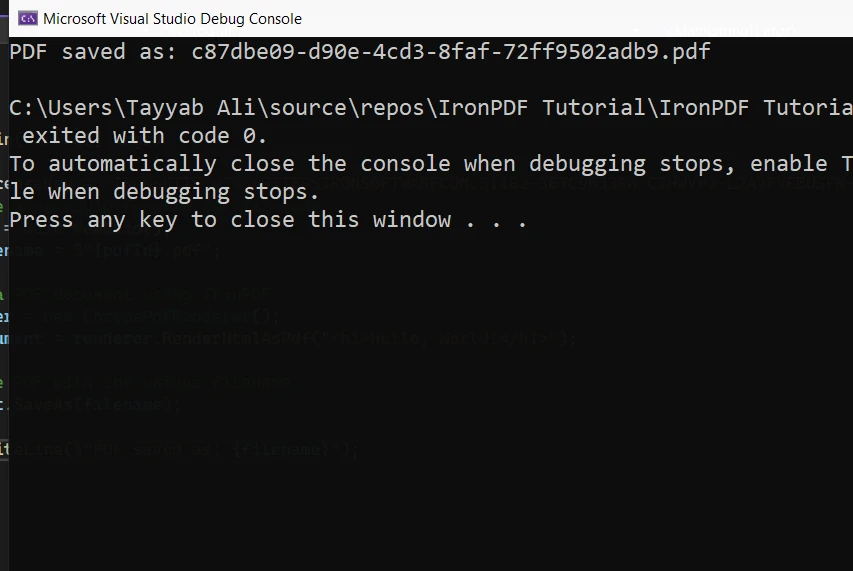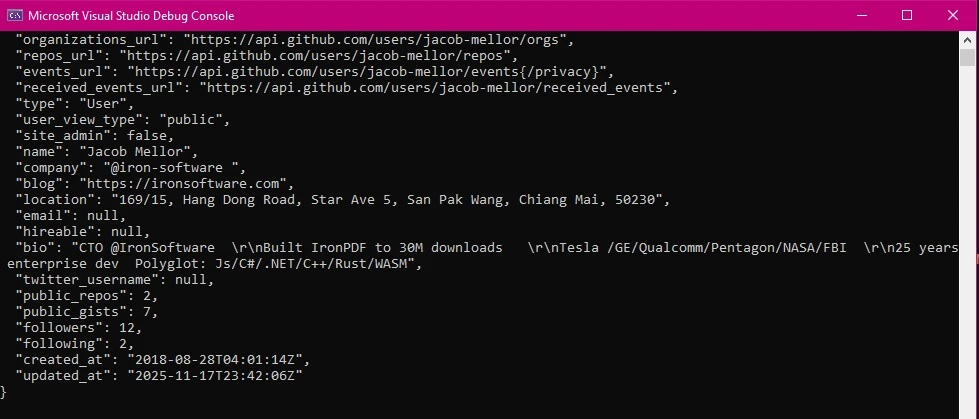C# New GUID (How It Works For Developers)
The NewGuid() method in a Guid class is commonly used to create a globally unique identifier (GUID). A GUID is a 128-bit integer that can be used across all computers and networks to uniquely identify information without the risk of duplicates. This article will provide an in-depth guide on how to work with GUIDs (Globally Unique IDentifiers) in C#, focusing on practical uses, examples, and code snippets. We'll explore the IronPDF library as well.
What is a GUID?
A GUID (Globally Unique Identifier) is a unique identifier used in software development. In the .NET framework, GUIDs are represented as a Guid struct within the System namespace. GUIDs are often used as primary keys in databases, as well as for other purposes in other systems where unique identifiers are necessary across systems.
Generating GUIDs in C#
To generate a new GUID in C#, the Guid.NewGuid() function is used. This method creates a new instance of a GUID object and ensures that each GUID generated is unique. Internally, GUIDs are generated using a random number generator to ensure that no two GUIDs have the same value.
Here’s a simple code example of generating a new GUID:
using System;
class Program
{
static void Main()
{
// Generate a new GUID
Guid newGuid = Guid.NewGuid();
// Output the newly generated GUID to the console
Console.WriteLine(newGuid);
}
}using System;
class Program
{
static void Main()
{
// Generate a new GUID
Guid newGuid = Guid.NewGuid();
// Output the newly generated GUID to the console
Console.WriteLine(newGuid);
}
}In this code, the Guid.NewGuid() method creates a new GUID using a random number generator internally, and Console.WriteLine outputs the newly generated GUID to the console.
GUID Structure and Format
A GUID consists of 32 hexadecimal digits, typically displayed in a format of 8-4-4-4-12 (e.g., e02fd0e4-00fd-090A-ca30-0d00a0038ba0). When converted to a string using the ToString() method, the GUID is represented in this format. This representation makes it easy to store GUIDs in text-based formats, such as JSON, XML, or databases.
The code example below shows how to convert a GUID to a string:
using System;
class Example
{
static void Main()
{
// Generate a new GUID
Guid newGuid = Guid.NewGuid();
// Convert the GUID to a string
string guidString = newGuid.ToString();
// Output the GUID string
Console.WriteLine(guidString);
}
}using System;
class Example
{
static void Main()
{
// Generate a new GUID
Guid newGuid = Guid.NewGuid();
// Convert the GUID to a string
string guidString = newGuid.ToString();
// Output the GUID string
Console.WriteLine(guidString);
}
}This code converts the GUID to a string and outputs it.
Parsing GUID Strings
Sometimes, you may need to parse a string back into a GUID object. This is done using the Guid.Parse() method. If the string is in the correct format, it will be parsed into a GUID instance. If the format is incorrect, an exception will be thrown.
Here is a code example:
using System;
class ParseExample
{
static void Main()
{
// Define a GUID string
string guidString = "e02fd0e4-00fd-090A-ca30-0d00a0038ba0";
// Convert the string back into a GUID object
Guid parsedGuid = Guid.Parse(guidString);
// Output the parsed GUID
Console.WriteLine(parsedGuid);
}
}using System;
class ParseExample
{
static void Main()
{
// Define a GUID string
string guidString = "e02fd0e4-00fd-090A-ca30-0d00a0038ba0";
// Convert the string back into a GUID object
Guid parsedGuid = Guid.Parse(guidString);
// Output the parsed GUID
Console.WriteLine(parsedGuid);
}
}In this code, the Guid.Parse() method converts the string back into a GUID object.
Comparing Two GUIDs
GUIDs can be compared to see if they are equal or not. The Guid struct implements the equality operator (==), so you can compare two GUID objects directly.
Here’s an example:
using System;
class CompareExample
{
static void Main()
{
// Generate two new GUIDs
Guid guid1 = Guid.NewGuid();
Guid guid2 = Guid.NewGuid();
// Compare the two GUIDs
if (guid1 == guid2)
{
Console.WriteLine("The two GUIDs are the same.");
}
else
{
Console.WriteLine("The two GUIDs are different.");
}
}
}using System;
class CompareExample
{
static void Main()
{
// Generate two new GUIDs
Guid guid1 = Guid.NewGuid();
Guid guid2 = Guid.NewGuid();
// Compare the two GUIDs
if (guid1 == guid2)
{
Console.WriteLine("The two GUIDs are the same.");
}
else
{
Console.WriteLine("The two GUIDs are different.");
}
}
}In this code, the two GUIDs are compared. Since each GUID generated by Guid.NewGuid() is unique, the result will typically be "The two GUIDs are different."
Common Mistakes When Using GUIDs
Assuming GUIDs Are Sequential: GUIDs are random, and the
NewGuid()method does not generate sequential values. Therefore, you should not assume that GUIDs will maintain any sort of order.String Comparisons Instead of GUID Comparisons: Comparing GUIDs as strings can be inefficient. Always compare GUID objects directly rather than converting them to strings and comparing the string values.
- Using GUIDs in Large Databases Without Indexing: GUIDs can be large and may impact performance in large databases if not indexed properly. Ensure that your GUID columns are indexed when using them as primary keys.
GUIDs in .NET Core and Framework
GUIDs are supported in both the .NET Framework and .NET Core. The usage of the Guid class remains consistent across different versions of the .NET platform. Therefore, developers working with any version of .NET can easily generate GUIDs using the Guid.NewGuid() method.
GUID vs UUID
GUIDs are similar to UUIDs (Universally Unique Identifiers), and the terms are often used interchangeably. While there are some minor differences in the specification, they serve the same purpose of generating unique identifiers.
Using IronPDF with GUID

IronPDF is a PDF library for generating PDFs from HTML and other PDF operations in .NET applications. You can combine IronPDF with GUIDs when you need to generate unique filenames for your PDF documents. This ensures that every PDF generated has a unique name, preventing any overwriting of files or conflicts in naming. Here's a simple example of using IronPDF with a new GUID:
using System;
using IronPdf;
class Program
{
static void Main()
{
// Generate a new GUID object for the PDF filename
Guid pdfId = Guid.NewGuid();
string filename = $"{pdfId}.pdf";
// Create a PDF document using IronPDF
var renderer = new ChromePdfRenderer();
var pdfDocument = renderer.RenderHtmlAsPdf("<h1>Hello, World!</h1>");
// Save the PDF with the unique filename
pdfDocument.SaveAs(filename);
Console.WriteLine($"PDF saved as: {filename}");
}
}using System;
using IronPdf;
class Program
{
static void Main()
{
// Generate a new GUID object for the PDF filename
Guid pdfId = Guid.NewGuid();
string filename = $"{pdfId}.pdf";
// Create a PDF document using IronPDF
var renderer = new ChromePdfRenderer();
var pdfDocument = renderer.RenderHtmlAsPdf("<h1>Hello, World!</h1>");
// Save the PDF with the unique filename
pdfDocument.SaveAs(filename);
Console.WriteLine($"PDF saved as: {filename}");
}
}Run the above code in Visual Studio and observe the output.

We use Guid.NewGuid() to create a unique random GUID for each PDF file. This GUID is converted to a string and used as the filename.
Conclusion

In this article, we’ve covered the basics of GUIDs in C#. You’ve seen how to generate new GUIDs, compare them, parse them from strings, and use them in practical scenarios like databases. The Guid.NewGuid() method makes it easy to generate a new instance of a GUID, ensuring that each identifier is unique across systems. Developers working in .NET can rely on GUIDs to provide randomness and uniqueness in their applications.
IronPDF understands the importance of testing before investing, which is why we offer a free trial. You can evaluate the software’s performance at no cost. If you find it beneficial, licenses start at $799.
Frequently Asked Questions
How can I generate a new GUID in C#?
In C#, you can generate a new GUID using the Guid.NewGuid() method. This function creates a new instance of a GUID object, ensuring each generated GUID is unique.
What are some practical uses of GUIDs in C#?
GUIDs in C# can be used for creating unique identifiers for database entries, generating unique filenames for documents, and ensuring uniqueness in distributed systems.
How can GUIDs be used to manage PDF filenames?
GUIDs can be integrated with PDF generation libraries to create unique filenames for PDFs. This prevents naming conflicts and ensures each document has a distinct identifier.
What is the difference between GUIDs and UUIDs?
GUIDs and UUIDs are essentially the same, both serving the purpose of generating unique identifiers. They are often used interchangeably in software development.
Can you convert a GUID to a string in C#?
Yes, you can convert a GUID to a string in C# by using the ToString() method on a GUID object.
How do you parse a GUID from a string in C#?
To parse a GUID from a string in C#, use the Guid.Parse() method. Ensure the string is in the correct GUID format to avoid exceptions.
How can GUIDs improve database management?
In databases, GUIDs can be used as primary keys to ensure each record is uniquely identifiable, especially when data is synchronized across multiple systems.
What are common mistakes when using GUIDs in C#?
Common mistakes include assuming GUIDs are sequential, comparing GUIDs as strings instead of directly, and not using proper indexing in large databases.
How can you compare two GUIDs in C#?
You can compare two GUIDs in C# using the equality operator (==). This allows you to check if two GUIDs are the same or different.





















